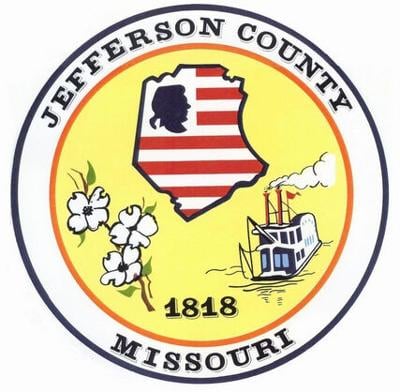Jefferson County Recorder of Deeds Debbie Dunnegan-Waters and state Rep. Phil Amato of Arnold are encouraging county residents to sign up for the Property Fraud Alert service.
Property Fraud Alert is an online, no-cost subscription service offered in partnership with county recorder’s offices that allows property owners to have their name monitored so possible fraudulent recordings affecting their property can be tracked.
Property fraud is among the fastest growing white-collar crimes, Dunnegan-Waters said, although she only knows about a couple of instances of that type of fraud occurring in Jefferson County since she became recorder of deeds in 2011, adding that those involved family disputes.
While it’s not a big problem in Jefferson County, residents should be aware of the issue because it is a crime that her office currently can’t prevent. By statute, her office is limited to recording and is not allowed to investigate, she said.
Dunnegan-Waters said her office has had a partnership with Property Fraud Alert through her office’s software system since 2014.
She said property fraud happens when someone records a fraudulent document, making it look like the person owns your home or property. Often when that kind of fraud occurs someone prints off a forged quit claim deed, uses someone’s notary credentials – many times without their knowledge, and then records the document, which says the seller has sold or deeded the property to the buyer, all without the seller’s knowledge.
“It’s really kind of crazy,” said Amato, who has tried to pass legislation to stem the problem. “You can actually steal somebody’s home, and you don’t even need their Social Security number to do it. These crooks … they’ll take property from the person by doing a quit claim deed. We’ve had a couple instances in Missouri, one in Ladue I think. Somebody stole their house, and it took them all kinds of time to get through the court system, and the attorney bills were enough to choke a horse.”
To sign up for Property Fraud Alert, visit propertyfraudalert.com or call 1-800-728-3858. Choose the county where you own property and how you want to be notified of activity affecting your property. Enter your name and other variations of your name, including common misspellings. She said you may even monitor documents involving your business or family members’ property.
“I put (my grandma’s) name in the registration with the notifications to come to me so that she doesn’t have to be stressed out about this stuff,” she said. “You can monitor anybody you want.”
She said the service is free.
“People don’t need to register anything more than their name, how they want their name monitored and how they want to be notified. They could be notified by email, phone call or text, and they would get that alert in less than 24 hours of something being recorded.
“I’ve heard the argument that, well, the crimes already happened. Yes, the crime has already happened, but you would know right away how to get a jump on it, instead of them being able to scam you further. I know it’s not a perfect fix.”
Dunnegan-Waters said Amato and other state legislators have been trying to come up with a solution for the past two years.
“But every solution they think they’ve come up with so far either hinders a person from being able to transfer their own property if they want to, or it’s an unfunded burden on this office,” she said.
Amato said he filed a bill last year in hopes of mitigating property fraud that didn’t get passed. He said over the past several months, he has met with about a dozen county recorders, as well as bankers to work out flaws in the bill’s language. He hopes to file a better bill on Dec. 1.
Amato said he believes one part of the improved bill will require county recorders to regularly notify residents that the free Property Fraud Alert program exists. Other parts of the new bill will substantially increase fines for notaries on fraudulent documents, will make sure that victims of property fraud can get their case heard before a judge in a reasonable period of time and will limit loans being issued against quit claim deeds.
Office limitations
Dunnegan-Waters said most people don’t understand what the Recorder of Deeds Office does.
“We record,” she said. “We don’t prepare. We don’t investigate. We are not an investigative office. We are completely administrative.”
Dunnegan-Waters said Chapter 59 of the Missouri state statute determines what the Recorder’s Office can do.
“Everything we do is set by state statute – even the fees that we charge,” she said. “Most people think they can come to the Recorder’s Office and that I can tell them where their well is or I can tell them where their sewer is or I can tell them who owns a road, or I can tell them who owns anything. I can’t tell you who owns anything. All I can do is tell you what documents were recorded. I can’t look at that document and say, ‘You are the owner of this property.’”
Dunnegan-Waters said the Recorder’s Office’s main job is to make sure the document that is being recorded adheres to requirements listed in the statute.
“And then make sure that we index it to where the people who are the investigators can find it – the investigators, being lawyers or title companies or banks, the people who are doing title searches,” she said. “We’re just the keeper of the record to make sure that they can investigate it.”
The statute provides few reasons for the Recorder’s Office to refuse recording a document. Those reasons include legibility and formatting of the document, such as font size and the use of something other than black ink, or the absence of a legal description, Dunnegan-Waters said.
“It’s my duty to record (a document) if it has a legal description, but I have no authority to know whether or not that legal description is correct,” she continued. “What happens once I record it, then the Assessor’s Office has a department called mappers, and they pull up the recorded documents. They’re the ones who verify if the legal description is correct. Anybody can bring me a document and record it as long as it adheres to that statute.”
Dunnegan-Waters said government officials rely on a notarized document being a legitimate document. Every document her office handles must be notarized before it arrives.
“The reason that recorders are supposed to be able to rely that the person signing that document is the person they say they are, is because the notary is supposed to check their ID before they notarize a document to make sure the person who is signing it is who they say they are,” she said.
The statute does not allow the recorder’s office to verify a notary, she said.
Dunnegan-Waters said the same software company that offers the Property Fraud Alert is working on a fraud alert system for notaries.
She said the idea is to provide regular reports to notaries about every document recorded with their notary seal to see if it has been misused.




